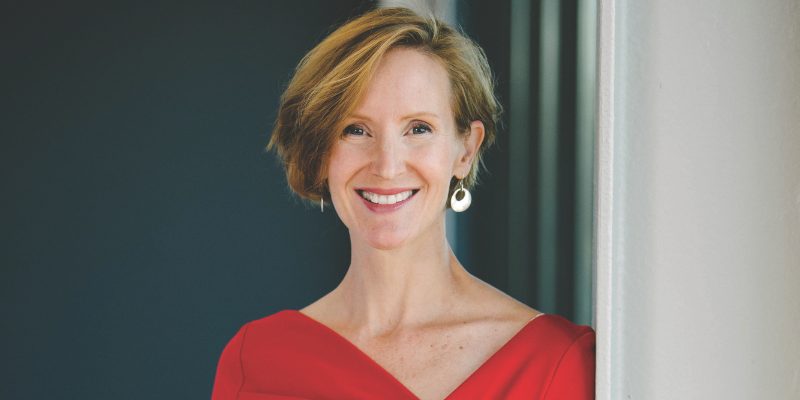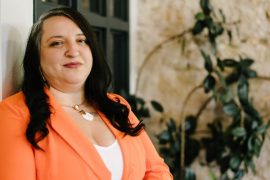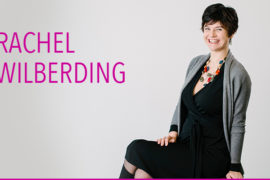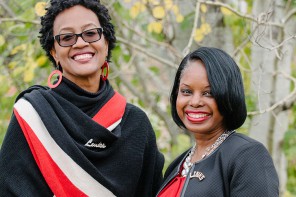By Jessica Steinhoff | Photo by Hillary Schave
Compromise, consensus and coalitions — the pillars of statecraft in democracies — rarely happen without considerate communication. That’s why Susan Yackee, professor and director of UW-Madison’s La Follette School of Public Affairs (and BRAVA 2024 Woman to Watch), has vowed to civilize political discourse in Wisconsin and beyond.
“If we can’t talk to each other in such a divided nation, we won’t tackle the most important issues of our time,” she says.
Yackee and her team of almost 50 faculty and staff are driving this point home as the fall elections approach. In addition to sharing evidence-based policy arguments through mass media and public presentations, they’re helping people across Wisconsin practice perspective- taking and active listening. Skills like these can foster the empathy, trust and respect policies and relationships needed to succeed.
Cultivating Compromise
The art of compromise isn’t extinct, according to Yackee. The problem is that people aren’t laying enough groundwork for compromise. It’s as true at the community level as it is at the Capitol.
It’s also the motivation for the Main Street Agenda, a collaborative project of the La Follette School and the Milwaukee Journal Sentinel. As Nov. 5 draws nearer, the newspaper has been publishing op-eds by La Follette faculty with expertise on policy topics Wisconsinites deem crucial. The Main Street Agenda is designed to help voters across the state better understand the issues — and each other.
“We’re hosting four roundtables where we expect more than 400 community members and trained facilitators will get together for dinner and a conversation about the issues that matter most to them,” Yackee says. “The hope is to bring about a sense that people with different perspectives are generally striving for the same things: a better society and the best future.”
These roundtables are slated for September and October in Madison, Eau Claire, Green Bay and Pewaukee (and are also in partnership with Wisconsin Public Radio). Separately, town hall meetings in Milwaukee and La Crosse will feature La Follette School faculty speakers and opportunities for the audience to ask questions.
Identifying Voters’ Priorities
Each policy issue explored in the Main Street Agenda events and op-eds stems from the WisconSays/La Follette Survey, in which nearly 4,000 Wisconsinites rate the importance of 11 topics ranging from education to taxation. The survey is led by the University of Wisconsin Survey Center.
“We present topics like inflation, gun control, climate change and government regulation,” Yackee says, “and ask how much of a problem each one is in Wisconsin and nationally.”
For nearly all the issues addressed, female survey respondents indicated more concern than their male counterparts, Yackee notes.
“They rate these issues higher in Wisconsin and higher at the national level,” Yackee says. “It’s clear that women really care about the policy issues of our times.”
In May, inflation — the focus of the Milwaukee town hall on Oct. 15 — garnered the most concern from the entire respondent group, with 63% calling it “quite a problem” or “an extremely big problem” in Wisconsin. Other high-concern state issues included gun violence, health care, crime, wealth distribution and climate change.
Respondents identified health care — a topic a panel will discuss at the La Crosse September town hall on Sept. 11 — as one of the most pressing national issues, along with gun violence and inflation. Overall, 54% called health care “quite a problem” or “an extremely big problem” for Wisconsin, while 69% felt this way about health care nationally.
Survey respondents hail from every region of the state and across the political spectrum. Identifying which issues they care about most can provide clues about shared goals, common ground and, in some cases, compromise.
Though compromise isn’t always feasible, civil dialogue is achievable, Yackee adds.
“It’s not about changing other people’s minds or values but better understanding where they’re coming from,” she says. “It’s easier to trust them when you get to know them. Trust and trustworthiness are the precursors to getting policy work done.”




